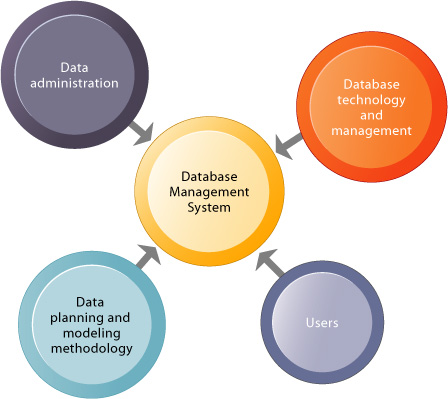| Section 7.5: Bullet Text | Chapter
Contents | View
Full Text | View Bullet Text |
Management Opportunities, Challenges, and Solutions
Organizational performance can be improved by making better use of firm data, improving data, and using techniques such as data mining.
Challenges to managing data effectively include organizational obstacles to a database environment and cost/benefit considerations.
Critical elements for creating a database environment are (1) data administration, (2) data planning and modeling methodology, (3) database technology and management, and (4) users. [Figure 7-18]
 |
| FIGURE 7-18 Key organizational elements in
the database environment For a database management system to flourish in any organization, data administration functions and data-planning and modeling methodologies must be coordinated with database technology and management. Resources must be devoted to train end users to use databases properly. |
Database systems require that an organization recognize the strategic role of information and actively manage and plan for information as a corporate resource. The organization must develop a data administration function with the power to define information requirements for the entire company and with direct access to senior management. The fundamental principle of data administration is that all data are the property of the organization; therefore all data are to be made available to any group that requires them. An organization should formulate an information policy that specifies rules and procedures for acquiring, inventorying, and distributing data.
The other critical elements of a successful database environment are a data planning and modeling methodology; database technology and management; and users. Because a database serves a wider community of users than traditional systems, organizations must devote more resources to training end users. Professional systems workers must be retrained in the DBMS language, DBMS application development procedures, and new software practices. Most corporations need a specialized database design and management group to develop and maintain their databases. Its functions are called database administration.